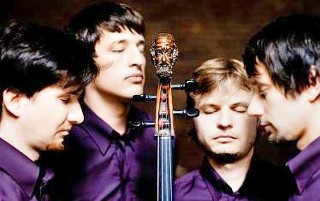|
Back
In One Era, Out The Other New York
Weill Concert Hall, Carnegie Hall
11/07/2014 -
Antonín Dvorák: String Quartet No. 11 in C Major, Opus 61
Karol Szymanowski: String Quartet No. 2, Opus 56
Dmitri Shostakovich: String Quartet No. 4 in D Major, Opus 83
Apollon Musagète Quartet: Pawel Zalejski, Bartosz Zachlod (Violins), Piotr Szumiel (Viola) Pitro Skweres (Cello)

Apollon Musagète Quartet (© Marco Borgreve)
The three works chosen by Poland’s Apollon Musagète Quartet last night resembled a Central European psychological history of war and peace.
The opening Dvorák, composed in 1881, was the reflection of a world on the verge of perfection, a Darwinian-Tennysonian earth where conflicts were temporary glitches, where melodies strolled down well-gardened paths, but always close to the main road.
The intermission was a gateway going up 50 years. Karol Symonouwski’s post-World War I setting displayed our world of disillusion, where the simplest themes, like Picasso portraits, were yanked out of shape, with out-of-sync marches, where, beneath the elegant craftsmanship, reality could explode at any time.
The Shostakovich Fourth Quartet, written after another “war to end all wars” had a gentleness which covered–or tried to cover–a seething wound. The Russian composer tried his best, with three movements of equal meter, to delude the listener. The final movement played the same songs which were which were anaesthetized into Fiddler On The Roof. But Shostakovich knew that nothing was joyous here, that the Jews were represented a persecuted Russia...an unsettled world.
The Apollon Musagète Quartet has won so many awards these last years that I was especially anxious to hear them in these three works. The four Polish players are perhaps too young to have experienced the Communist regime, though they certainly heard stories about their history. Equally important, they are the new generation of a Polish renaissance which included Penderecki and Lutoslawski, and their colleagues around Poland. So their heritage and their future should make them ideal messengers of these three generations of Central European composers.
They certainly stand out in appearance, three of them standing straight, not glancing at each other, yet faultlessly in relation with each other. Their sounds are unfailingly bright, their accents composed of sharp colors, fearless, never dissembling emotions or feelings.
In the Shostakovich finale, their near-shouting first notes were the introduction to the Hebraic songs. They were deliberately emotional, so the songs somehow had a more natural feeling. The shtetl–theatrical music of Fiddler On The Roof, attractive enough as entertaining anodynes, never had that urgency, that desperate feeling of cold and warmth which Apollon Musagète offered.
This movement was even more unnerving after the breathy lightness of the other movements, with an underlying, never harsh sadness in the Andantino.
The Dvorák Quartet, taking up the first half of the program, was the least impactful of the evening, though this was never the fault of the group itself. But this was one of the composer’s more “contented” works, a piece written with enormous craftsmanship and artistry, yet never pointed in its message. Sedation in the concert hall is tantamount to sedition.
What did impress was the group itself. They performed with unabashed elegance, with a most stately lyrical opening movement. The second movement was indeed cantabile with violinists Pawel Zalejski and Bartosz Zachlod doing the honors. The finale was played without headstrong tempos, but more measured, the outstanding plaudits going to Mr. Zalejski in his short cadenzas.
The one piece which will always stand out was the shortest, Szymanowski’s second Quartet. Nothing was esoteric here, for this was a gorgeous three-movement rhapsody, many of the tunes of a folkish mien, directly from Szymaowski’s beloved Tatra peasants. (He was an aristocrat himself, but as an incessant traveler to exotic climes, he never was condescending to other peoples.)
Apollon Musagète, his Polish colleagues, didn’t need to emphasize the brutal interruptions, the sudden stops and starts of the piece. Like Janácek, these were like grammatical syntaxes of the Tatra people themselves. So the ensemble retained an elegance, a cutting-edge song of the work, their own prowess making even that final double-fugue something naturally gorgeous rather simply a technical challenge.
For the one encore, they paid homage to the composer of their own title, Igor Stravinsky in his Tango. Here they went to work with such unrelenting rhythms, that they wouldn’t have been out of place in Buenos Aires Carnival itself.
Harry Rolnick
|